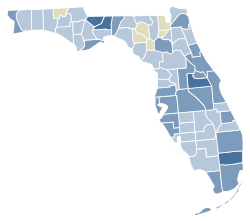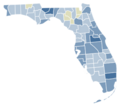2018 Florida Amendment 4 facts for kids
| Florida Amendment 4 (2018) | ||||||||||||||||||||||
|---|---|---|---|---|---|---|---|---|---|---|---|---|---|---|---|---|---|---|---|---|---|---|
| Voting Rights Restoration for Felons Initiative | ||||||||||||||||||||||
| Location | Florida | |||||||||||||||||||||
| Date | November 6, 2018 | |||||||||||||||||||||
|
||||||||||||||||||||||
|
||||||||||||||||||||||
Florida Amendment 4 was a change to the Constitution of Florida. It was voted on by the public on November 6, 2018. This change was also called the Voting Rights Restoration for Felons Initiative.
The main goal of Amendment 4 was to give back voting rights to people in Florida who had finished their sentences for serious crimes. This included completing any parole or probation.
A group called the Florida Rights Restoration Coalition led the effort for this amendment. Many other groups supported it, like the American Civil Liberties Union and the Christian Coalition of America. Some politicians from the Democratic Party supported it, while some from the Republican Party did not.
Amendment 4 passed with 64.55% of people voting "yes." Because of this, about 1.4 million people who had finished their sentences for past crimes became able to vote again starting January 8, 2019.
Contents
Why Voting Rights Changed in Florida
Before 2018, Florida was one of only a few U.S. states where people who had committed serious crimes could permanently lose their right to vote. This affected about 1.7 million people in Florida.
To get their voting rights back, these people had to wait five to seven years after finishing their sentence. Then, they had to ask the State Board of Executive Clemency for permission. This board included the Governor of Florida and other state leaders. They met only four times a year.
In 2007, Governor Charlie Crist made it easier for some people to get their voting rights back. People who had committed less serious crimes could get their rights restored automatically. During his time as governor, over 155,000 requests were approved.
However, when Rick Scott became governor, he changed the rules again. With advice from Florida Attorney General Pam Bondi, he stopped the automatic restoration. He brought back the long waiting period before people could even ask for their rights back. In the first seven years of Governor Scott's time, only about 3,000 requests were approved.
Some people felt this process was unfair. In 2017, seven people who had past convictions sued the state of Florida. They argued that the way voting rights were restored was not fair or consistent. In 2018, a judge named Mark E. Walker agreed that Florida's process was unconstitutional. He said it relied too much on the Governor's personal decision. However, the state appealed this decision, so the ruling was put on hold.
How the Campaign for Amendment 4 Started
Desmond Meade became a leader in the effort to restore voting rights. He had a past conviction himself and later earned a law degree. He became the head of the Florida Rights Restoration Coalition in 2009.
Mr. Meade led a big effort to get Amendment 4 on the ballot for the 2018 election. They collected 799,000 signatures from voters, which was enough to get it approved in January 2018. For the amendment to pass, at least 60% of voters had to approve it.
Another strong supporter was Demetrius Jifunza. His voting rights were taken away in 1995 due to a past conviction. He later became a paralegal. Mr. Jifunza started the Sarasota Chapter of the Florida Rights Restoration Coalition. He also helped lead a successful media campaign to help pass Amendment 4.
The Florida Rights Restoration Coalition worked with groups like the American Civil Liberties Union and the Christian Coalition of America. A group called Freedom Partners also supported the amendment.
What Amendment 4 Said
When people voted on November 6, 2018, the text of Amendment 4 on the ballot said:
No. 4 Constitutional Amendment Article VI, Section 4. Voting Restoration Amendment This amendment restores the voting rights of Floridians with felony convictions after they complete all terms of their sentence including parole or probation. The amendment would not apply to those convicted of murder or sexual offenses, who would continue to be permanently barred from voting unless the Governor and Cabinet vote to restore their voting rights on a case by case basis.
This meant that most people who had finished their sentences for past crimes would get their voting rights back. However, it specifically said that people convicted of murder or sexual offenses would still not get their voting rights back automatically. They would still need a special vote from the Governor and Cabinet.
Voters could read the full text of the amendment in a booklet from the Florida Division of Elections. As mentioned, 60% of the votes were needed for it to pass.
Voting Results
Florida Amendment 4 (2018) |
|||
| Choice | Votes | % | |
|---|---|---|---|
| Yes | 5,148,926 | 64.55% | |
| No | 2,828,339 | 35.45% | |
| Total votes | 7,977,265 | 100.00% | |
| Registered voters and turnout | 13,200,872 | 60.43% | |
What Happened After Amendment 4 Passed
Amendment 4 officially started on January 8, 2019. This made about 1.4 million people who had finished their sentences able to register to vote.
However, there was some disagreement about how the amendment should be put into action. Governor Ron DeSantis believed that the Florida Legislature needed to pass a new law to help election officials check if people were truly eligible to vote. But others, like Bill Galvano, the president of the Florida Senate, thought the amendment was clear enough and didn't need a new law.
In mid-2019, Governor DeSantis signed a new law, called SB 7066. This law said that people with past convictions had to pay all their fines and fees related to their sentence before their voting rights could be restored. Many people who supported Amendment 4 felt this new law went against what voters wanted.
This new law led to more legal challenges. A judge named Robert Hinkle ruled in May 2020 that parts of the law were unconstitutional. He said that people who could not afford to pay their fines and fees should still be allowed to vote. He also ordered the state to make it easier for people to find out how much they owed.
However, the state appealed this decision. On September 11, 2020, a higher court, the United States Court of Appeals for the Eleventh Circuit, overturned Judge Hinkle's ruling. This meant that the requirement for people to pay all their fines and fees before voting was upheld. So, to vote, people with past convictions must pay all their fines and fees.
Images for kids




